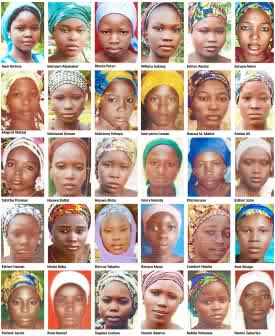The Contagious Chibok Syndrome
By Francis Abayomi
The reality of Stockholm Syndrome portends serious cause for concern with respect to alleged refusal by one of the abducted girls to break-free from her abductor(s) after her liberty has been negotiated. Nevertheless, there is a rather worrisome and pervasive disorder coming across as the ‘Chibok Syndrome’ plaguing the larger Nigeria space. With infectious and rather consuming ferocity, Chibok Syndrome has become a ravaging flu amongst the supposed free citizens who have never been victims of abduction or any physical attack by Boko Haram. This pervasive disorder relates to the extent to which Nigerians have become willy-nilly victims of denials beyond what ordinarily could be imagined.
Chibok Syndrome conveys the pattern of confusion that has inflicted the collective psyche of a people; foisting denials, duplicities and if not complicities in the wake of high-wire politics and hideous scheming that have underscored the Boko Haram narratives. It is particularly intriguing that the confusion seemed to have been heightened with lack of commitment in telling the citizens the truths. The syndrome is drawing a large followership from the public spaces as well as international circles. Nigeria’s political history is rooted in timeserving appeasement as well as convenience of denials. Serious issues rarely enjoyed holistic interrogation and appraisal or accorded nationalistic commitment. It should therefore be clear why Chibok Syndrome may as well remain a giddying feature of the politics around Boko Haram for a long period.
Expectedly, most Nigerians woke up on Sunday, 7th May, 2017 to the cheering news of the release of 82 abducted Chibok girls. When over 200 hundred girls of Government Girls Secondary School in the hitherto sleepy and relatively unknown Chibok town were seized on 14th April, 2014, the news was at first guarded but later became a major highlight of international development for close to a year. The shock wave of the reality of Chibok across the globe did not however vitiate deep-seated doubts over the authenticity or veracity of the abduction.
Not even the video clip released by Boko Haram showing the girls in captivity was enough to douse debates over the kidnap. The debate was whether it real or simply a scam! Questions were raised as to how such mass kidnap took place in no less than a government school and yet no daughter of a high profile citizen was involved? And shockingly no answer; at least convincing enough! Nevertheless, that over 200 school girls and citizens of a country were forcibly taken out of their hostel and held hostages should have been enough to unite a people against a terrorist group, but it didn’t turn out that quite easy as Nigerians became more divided.
Chibok Syndrome is thus the direct fallout of lack of consensus as to what Boko Haram truly represents for the immediate and larger Nigeria’s environment. It is arguable if the phenomenon of Boko Haram could have festered so long without decisive and definitive response from the might of Nigerian military if divisive politics had not encourage contradictory and if not antagonistic posturing from quarters merely pretending to be protecting sectional interests. Any surprise then that we have since seen such bravado modified with the change in the tide of politics? There is therefore no denying that Boko Haram has benefitted more from the politics of denials in Nigeria compared with other climes where terrorism is seen and condemned for the evil it represents.
The effect of Chibok Syndrome has thus played out with the release of 82 of the abducted Chibok girls, the same way circumstances surrounding the mass kidnap of the girls raised dusts. While there should be no much fuss about securing the freedom of the girls with the swapping of high-flying terrorist commanders, the management of information with regards to the release is yet a subject of confusion. The raging concern about the story of abducted girls and the circumstances surrounding their release is coming at the heels of concern that 20 of the abducted girls had earlier regained freedom in circumstances yet to be properly chronicled and with parents and concerned stakeholders denied access to them after a year. Indeed, there is confusion with regards to the first returnee; Amina Ali Nkeki who was said to have been found by soldiers why allegedly roaming hitherto Boko Haram fortress; Sambisa forest prior to its liberation by soldiers in December 2016.
As we ponder the effect of Chibok Syndrome beyond the immediate future, Nigerians should not forget the role key opinion moulders have played in deepening this confusion rather than mitigate the mounting effect of Chibok Syndrome. How can we possibly forget that ex-president Olusegun Obasanjo told the world the missing Chibok girls could never be rescued considering the length of time of their abduction? President Muhammadu Buhari also hinted that the girls have been dispersed and married off against their wishes. So, where did this large number of the girls come from? Perhaps nothing heightens the confusion that is Chibok Syndrome at the moment more than statements that have been less than convincing from official quarters regarding the identities of freed girls; lack of access by their families and apparent unwillingness by government to engage stakeholders; including the BBOG advocacy group in the process of reintegrating the girls back to the society.
This article first featured in HARDBEAT COLUMN; INDEPENDENT SUNDAY, 14th May, 2017

